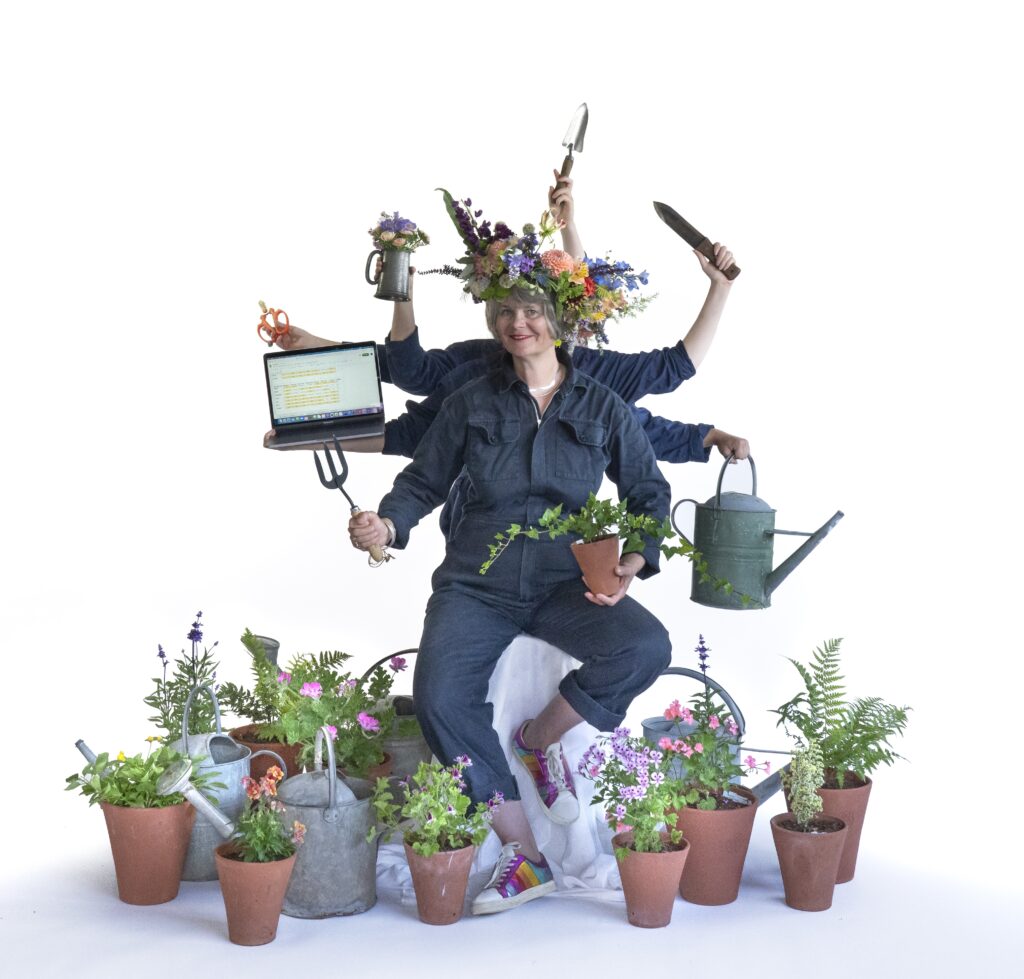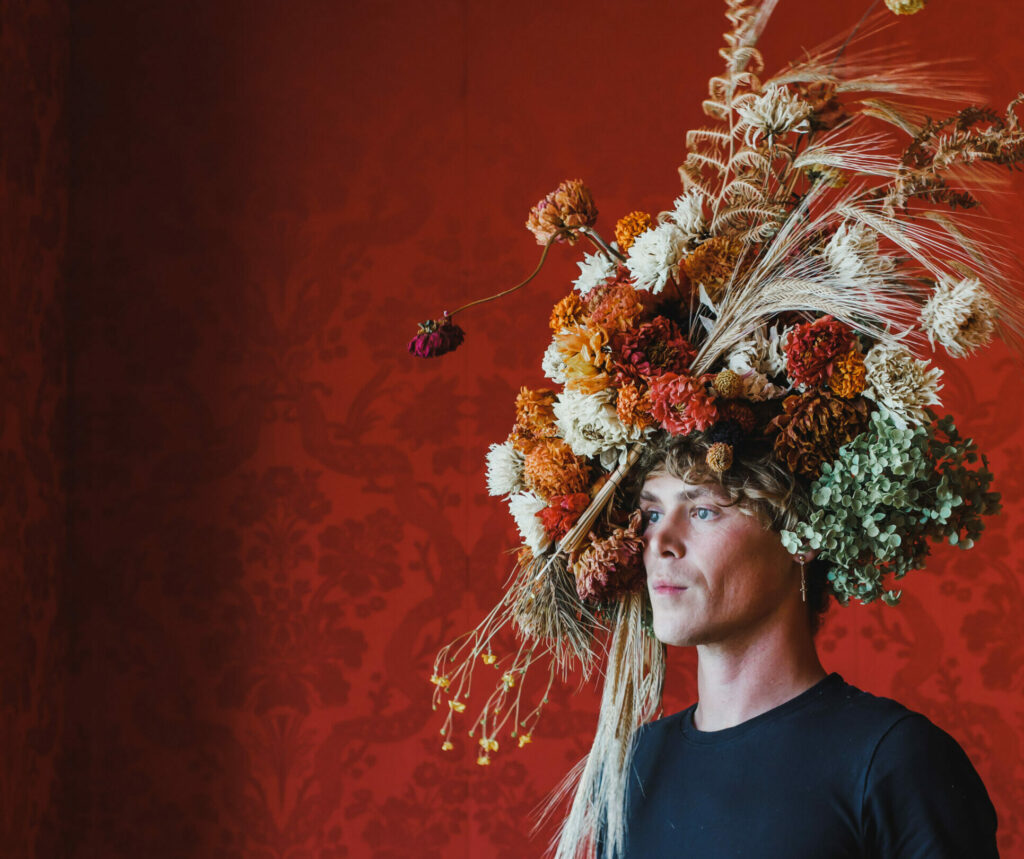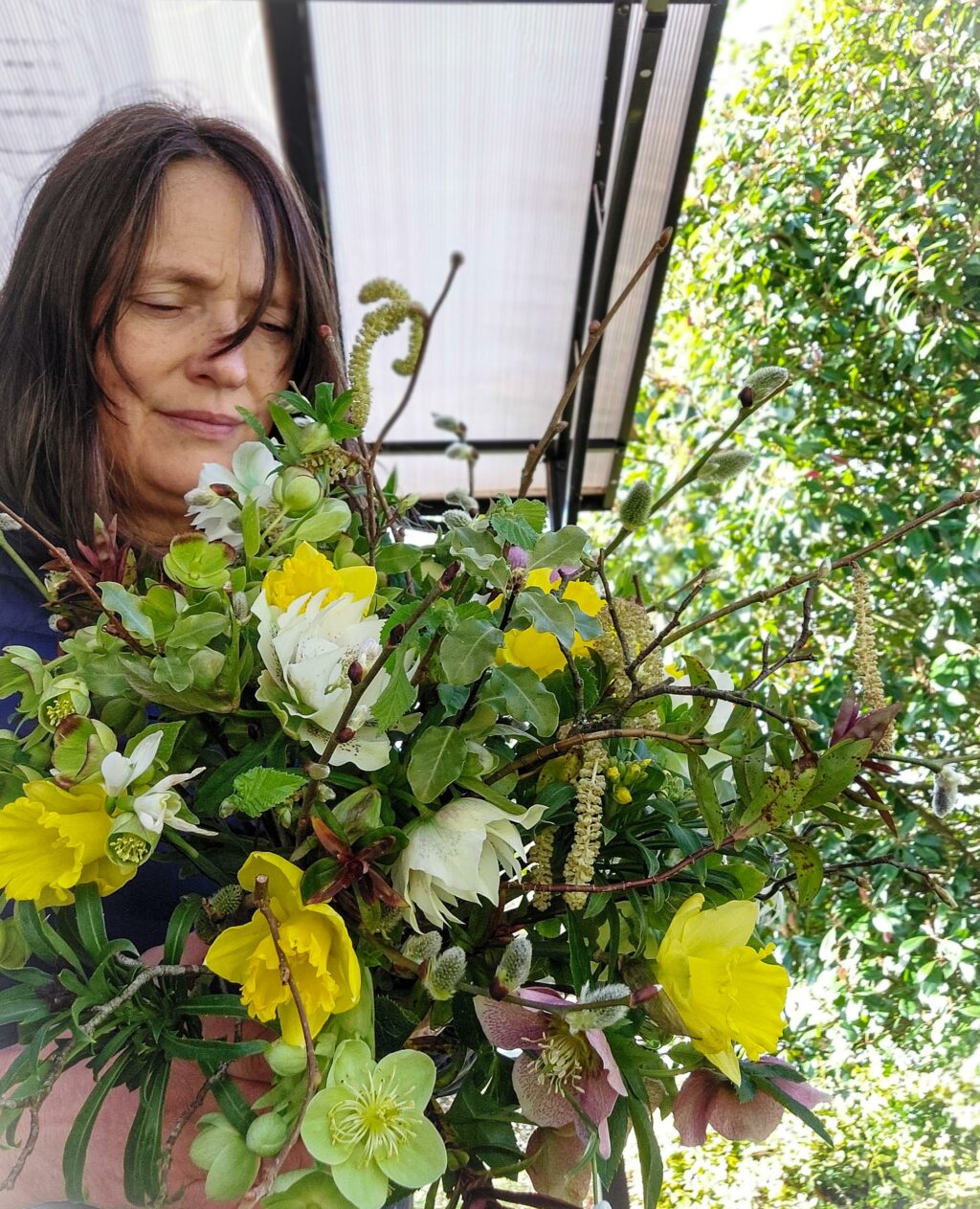Sustainable floristry: come and learn with us!
Earlier this year, a team of FFTF members launched a new floristry school dedicated to teaching sustainable methods and championing British grown flowers. Inspired by the news, we review how our membership is promoting environmental awareness within the floristry sector through outreach and education. Here is a guide to the where, how, and with whom you can learn more.
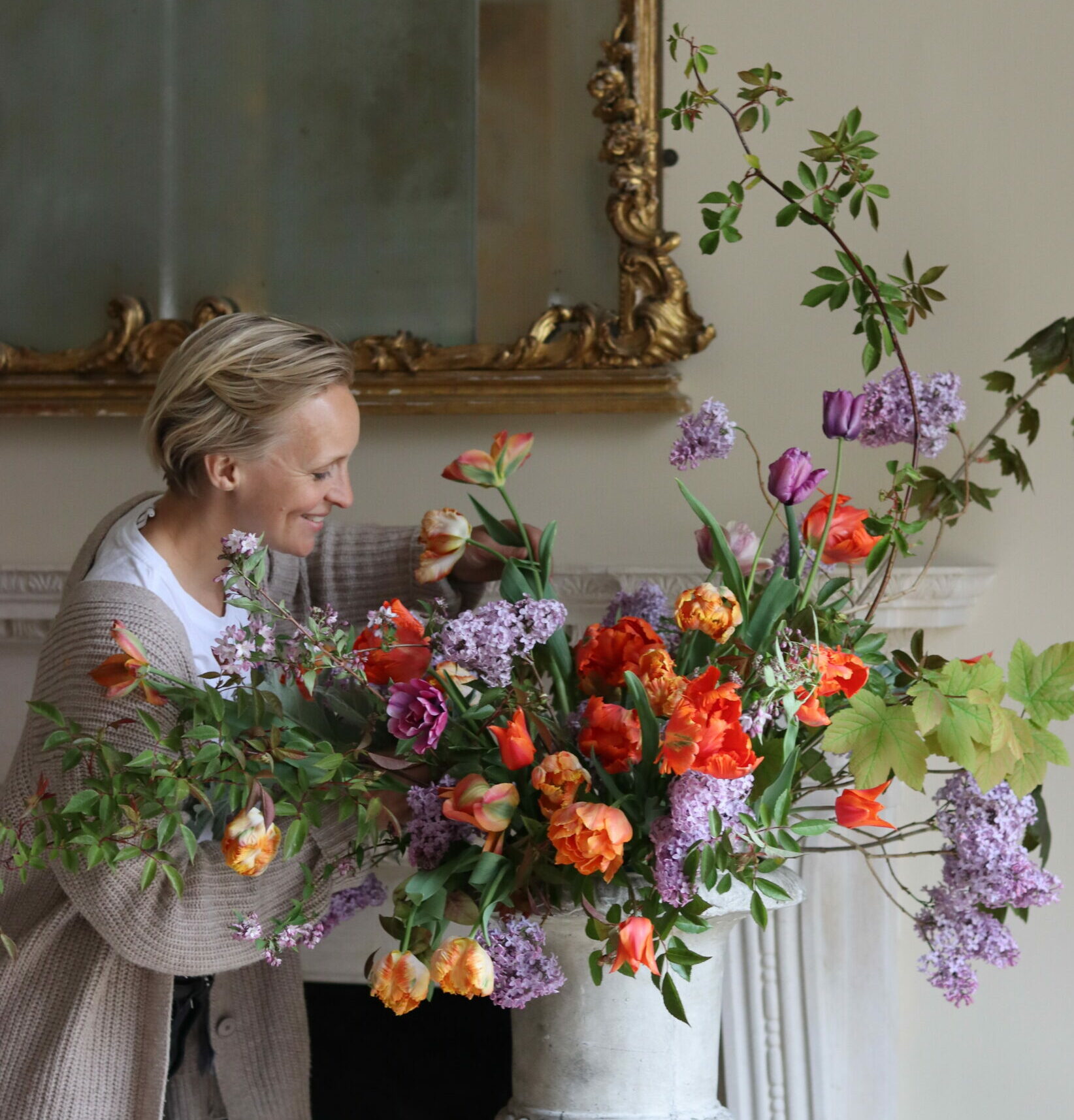
Cissy Bullock demonstrating a foam-free urn arrangement for students at The School of Sustainable Floristry
The School of Sustainable Floristry
Cissy Bullock of Wildstems announced in February that she was launching The School of Sustainable Floristry, based in Bedfordshire and run in partnership with fellow FFTF members Howbury Farm Flowers.
For Cissy, the new school is a response to two key barriers to the use of seasonal, locally grown flowers within the British floral industry. On the one hand, the misconception that British flowers are inferior to mass-produced, imported alternatives in terms of quality and longevity; and on the other, the disconnect between British growers and florists, which means that florists often have little concern for the provenance of the flowers they use.
“Teaching new and seasoned florists how to work with locally grown flowers and without floral foam feels like the missing piece of the puzzle in our industry at the moment,” says Cissy. “All too often I hear of courses continuing to teach with floral foam because they don’t think there’s a viable alternative, and all too often I hear florists say ‘British flowers don’t last as long or perform as well’. I want to show that neither of these things is true. I want to pass on my knowledge, experience and enthusiasm for season-led, sustainable floral design in the hope that we can make the UK floral industry a little more local and sustainable.”
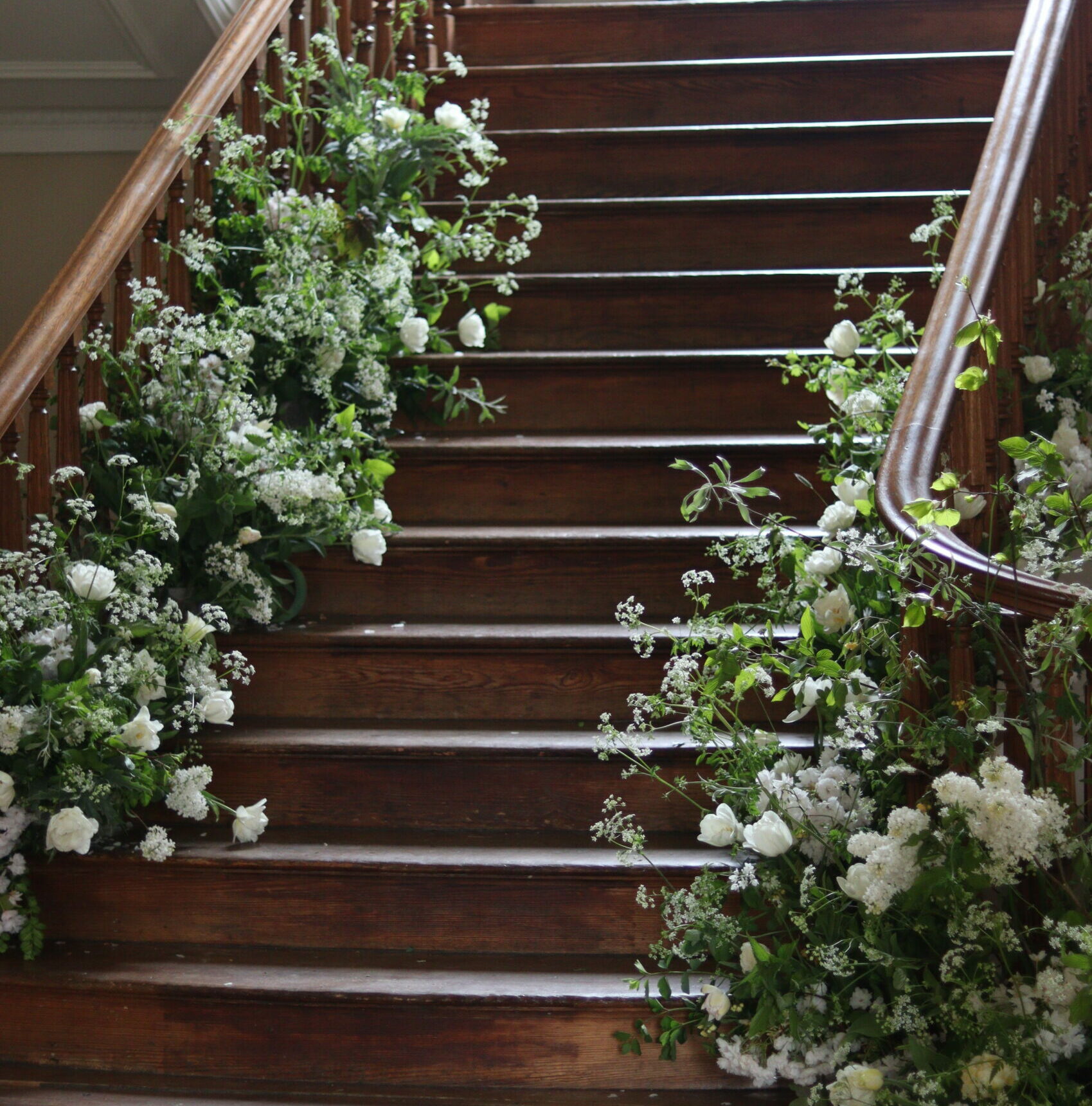
Detail of a stairway installation in classic green and white made by Cissy and her students.
The discovery of Flowers from the Farm was instrumental in Cissy’s own transition from floristry using imported flowers and floral foam to the very different kind of floral design she practices today. Building relationships with local growers helped her to appreciate why certain flowers were only available at certain times, how they should be handled so that they performed to their fullest, and what kind of sustainable mechanics were possible for the typical pieces that florists are asked to produce. With the new school, Cissy aims to fast track her students through her own learning process, and equip them with everything they need to design seasonally and sustainably all year round.
Alongside its flagship Season-led Professional Florist Programme, the school offers a range of shorter, specialised workshops, many of which echo work being done by other FFTF members to educate the floristry community and wider public about sustainable approaches. One in particular, focused on foam-free church flowers, picks up the thread of a nationwide initiative that also has its roots in FFTF.
Sustainable Church Flowers
The Sustainable Church Flowers (SCF) network was set up in 2019 by Kate Hurst of Camomile & Cornflowers and Candy Connolly (wife of renowned florist Shane Connolly) with the aim of stopping the use of floral foam and encouraging the choice of locally grown flowers within British churches and churchyards.
The arguments of SCF remain sensitive to the scripture, liturgy and mission of the Church of England, and seek to position the debate around church floristry within that context. Equally, there is no pretence that a transition to sustainable methods is easy. The goal is nothing short of “a whole different approach…to the gathering and display of flowers within the church. It may not always be possible to do the displays that we might hope for, but it is far more important to do what we can with what is available.”
There are now nearly 30 ambassadors for SCF across the country – all members of Flowers from the Farm – who offer demonstrations and affordable workshops to local church groups in order to teach them about the environmental issues associated with floral foam and imported flowers, and the potential for alternatives.
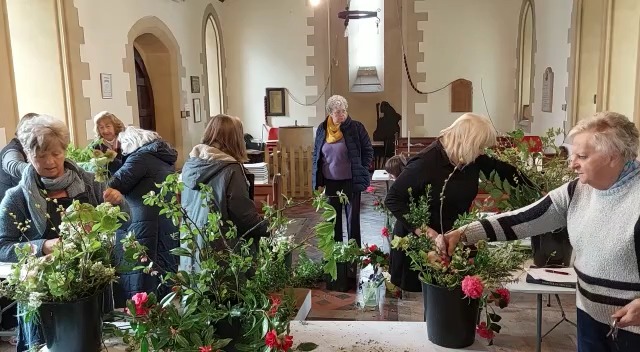
Buckets of British blooms at a sustainable church flowers workshop run by Kate Hurst.
Kate and Candy themselves have run five successful workshops for over 75 members of their local church community – three on foam free Advent wreaths, and two on pedestal displays. Kathryn and Lorna Murray of Skylark Flower Company recently held a workshop for attendees from 10 different churches within a single benefice – and the feedback they received shows a genuine appetite for change amongst church florists:
“Thank you SO much for the fascinating presentation you gave us…I was intrigued and shocked by my thoughtlessness on these subjects. I had already been made aware of the dangers of using floral foam, but I hadn’t considered the chemicals involved in using imported flowers from the supermarket.”
“[I] have already sent a message to our church congregation that we shall no longer be using floral foam in our usual Sunday flower arrangements and flowers will be local and therefore more sustainable.”
One parishioner, prompted by the SCF movement, called in February on the General Synod (the Church of England’s legislative body) to consider banning the use of floral foam in its churches. This became national news, receiving coverage in the Daily Telegraph and Daily Mail, and also on BBC Radio 4, where FFTF founder Gill Hodgson and member Tammy Hall were both asked to comment on the story for the Today Programme.
Green Funeral Flowers
Central to church floristry are funeral flowers, and former FFTF co-chair Carole Patilla has created a dedicated online course on this topic – simply called Green Funeral Flowers.
As well as the technical and creative challenges of designing sustainable floral tributes, Carole’s course covers other important aspects of the funeral process for a florist to consider. It touches on working with undertakers and communicating with families, and deals too with making funeral floristry a profitable part of a floral business.
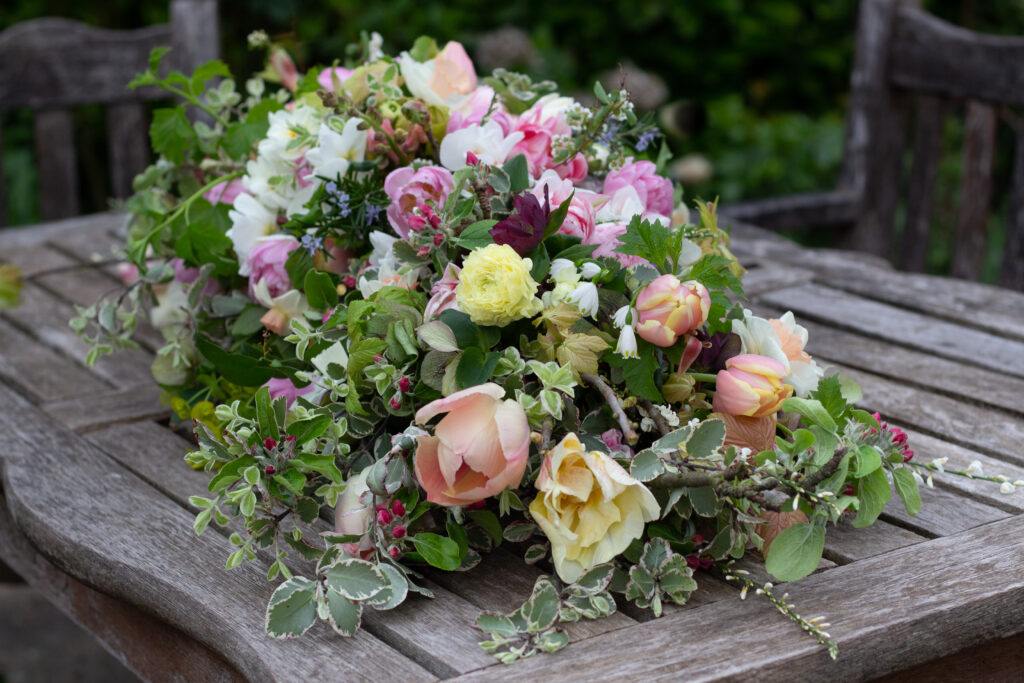
Carole’s ‘Gerry’ casket spray. Her designs are named after the first person they were made in tribute to.
A mixture of text and video resources, all the materials for Green Funeral Flowers are available online, and follow an increasing trend for online teaching in the wake of the Covid pandemic. Nonetheless, flowers are nothing if not a hands-on medium, and plenty of our members are still running in-person workshops this year on sustainable, foam-free techniques. Below is a selection of what is on offer around the country.
Round-up: Sustainable floristry workshops with FFTF members 2022
North and Flower – Cheshire
Sustainable floristry techniques, Thursday 19 May
Saxon Gate Flowers – Bedfordshire
British flowers workshop, Saturday 18 June
Pulvertoft Flowers – Lincolnshire
Field to jar workshop, Saturday 25 June
Far Hill Flowers – Monmouthshire
Sustainable flower arranging workshop, Tuesday 12 July
The Ledbury Flower Farmer – Herefordshire
Sustainable floral mechanics, Friday 5 August
Bloomery – Cotswolds
Field to vase and sustainable floristry workshops
Little Park Flowers – Berkshire
Sustainable floristry workshops for local and church florists (contact for information)
The School of Sustainable Floristry – Bedfordshire
Courses and workshops on season-led floral design
Sarah Hammond (of English Peonies), Norfolk School of Gardening – Norfolk
Spring, summer and autumn workshops on cutting, conditioning and arranging with locally grown flowers
Camomile & Cornflowers – Worcestershire
Sustainable church flower workshops (contact for information)
Skylark Flower Company – Berkshire
Sustainable church flower workshops (contact for information)
Flower School at Hampton Court, 7 – 9 July
It has also been announced that Flowers from the Farm will be official supporters of the first ever Flower School at the RHS Hampton Court Palace Garden Festival. Every flower and stem of foliage will be supplied by FFTF growers – from the flowers decorating the marquee to those used by the UK’s leading florists and flower farmers on stage and for a series of public workshops. Keep your eye on the Garden Festival website – and on us here at FFTF – for more information in the coming weeks.

